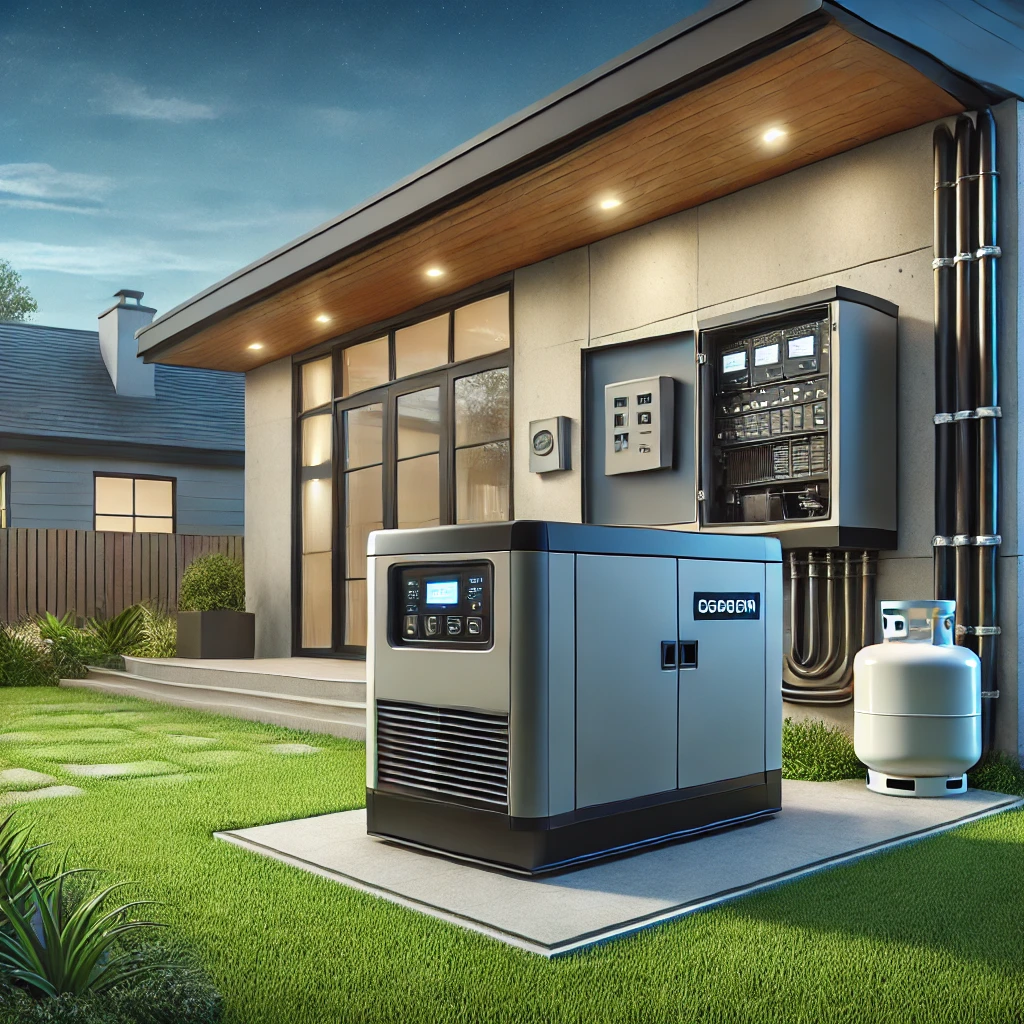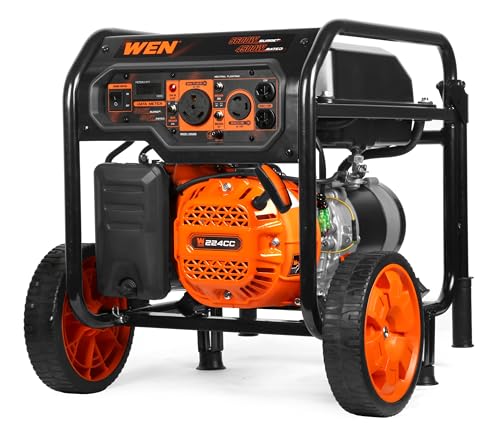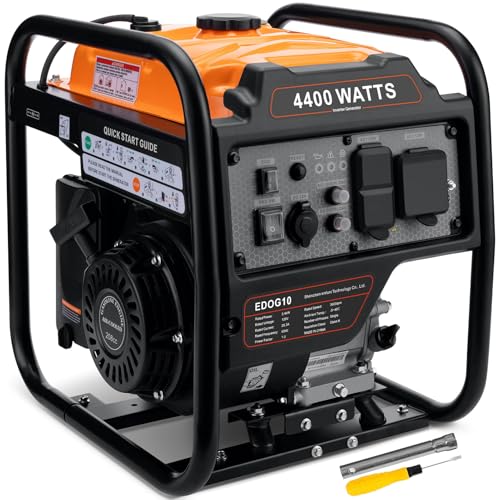
Choosing the right home generator can be overwhelming with so many options available.
With more frequent power outages and the growing need for reliable energy solutions, having a generator is no longer a luxury—it’s a necessity.
This article is my deep dive into the best home generators for 2026, their features, and what makes them stand out.
Here’s Our Top Picks of The Best Home Generators in 2026
- 9500 Running Watts and 12500 Peak Watts (Gasoline); 8500 Running Watts, 11200 Peak Watts (Propane); Remote Start with Included Key Fob, Electric and Recoil Start; Up to 12 Hours of Run Time on a 6. 6 Gallon Fuel Tank with Fuel Gauge
- Features Two GFCI 120V 5–20R 20A Standard Household Receptacle, One Transfer Switch Ready 120V L14-30R 30A, and One RV Ready 120/240V 14–50R 50A; All Outlets Have Rubber Covers for Added Safety
- Perfect as a backup power source for larger homes or a dependable source of portable power
- 14,500 peak watts, 11,500 running watts (gasoline); 13,500 peak watts, 10,500 running watts (propane); 12,000 peak watts, 9,500 running watts (natural gas)
- Switch between gasoline (4750 surge watts, 3800 running watt) and propane (4350 surge, 3500 running) with the simple turn of the selection dial
- Voltage easily goes from 120V to 240V, perfect for transfer switches and emergency backup
- Keep your family safe with 5600 starting watts and 4500 running watts of power
- Electric start functionality turns the 224cc engine on with the press of a switch
- Keep your family safe with 5600 starting watts and 4500 running watts of power
- Wheel and handle kit makes for easy transport between uses
- 13,000 Watts of Reliable Power for Home Power Backup – Keep your home, job site, or RV powered during storms and outages with dual fuel capability and a heavy-duty build.
- Dual Fuel Technology – Gasoline or Propane – Choose between gasoline for maximum power or propane for longer run times and cleaner emissions, ensuring fuel flexibility in any emergency.
- HIGH POWER OUTPUT: With a starting wattage of 4400W and a rated wattage of 3600W, this generator provides ample power for your home, RV, or job site needs
- EXTEND RUNTIME: Equipped with a 1.6-gallon fuel tank, it offers an impressive 11 hours of runtime at 25% load, ensuring long-lasting performance without frequent refueling
- With 13,000 watts of power, the XP13000HX Dual Fuel generator will keep your whole home running during a storm or power outage, while protecting your family from harmful fumes with CO Alert
- Enjoy the freedom and flexibility of running your generator on either gasoline or propane. Propane is cost effective, clean-burning, fuel efficient, low maintenance, has a long shelf life, and is a readily-available fuel source.
- 7 X Faster Charging. 0-80% in just 50 mins and 0-100% in 80 mins with AC input. That’s ideal when you need home backup power and a quick charge using your wall outlet.
- Expandable Capacity from 1-3kWh. With the standalone portable power station sporting 1kWh, you can add on extra batteries to reach up to 3kWh. Ideal for camping, RVs or off-grid living.and a quick charge using your wall outlet.
- Powerful Output: 4400 peak watts and 3400 running watts, 2*120V AC ports, 1* 30A RV port, 1*12V DC port, 14 hours runtime at 25% load
- Gas Powered: 2 gallon fuel tank capital
- 13500 Peak Watts, 10500 Running Watts (Gasoline); 12500 Peak Watts, 9500 Running Watts (Propane); 10000 Peak Watts, 8500 Running Watts (Natural Gas); Remote Start with Included Key Fob, Electric and Recoil Start; Up to 19 Hours of Run Time on a 9.5 Gallon Fuel Tank with Fuel Gauge
- Features Two GFCI 120V 5–20R 20A Standard Household Receptacle, One Transfer Switch Ready 120V L14-30R 30A, and One RV Ready 120/240V 14–50R 50A; All Outlets Have Rubber Covers for Added Safety
- With 13,000 watts of power, the XP13000EH Dual Fuel generator will keep your whole home running during a storm or power outage
- DuroMax is the industry leader in Dual Fuel portable generator technology, with a full assortment ranging from digital inverters to generators that can power your entire home
What to Consider in a Home Generator
Before purchasing a generator, I think it’s essential to understand what you’re looking for. Consider the following:
- Power Needs: Assess how much power you’ll need to run essential appliances.
- Fuel Type: Decide between gas, propane, or dual-fuel options.
- Runtime: Look at how long the generator can operate on a single fuel tank or charge.
- Noise Levels: Noise is a significant factor, especially for portable generators.
- Size and Portability: Consider whether you need a stationary unit or something portable.
How to Choose a Generator
I’ve found that selecting the right generator comes down to understanding your specific needs. Do you need backup power for your entire house or just a few appliances? Do you prefer eco-friendly options like battery backups? Here’s a step-by-step process:
- Calculate your wattage requirements.
- Decide on the type of generator.
- Set a budget.
- Research reputable brands.
- Check for essential features like automatic transfer switches and low-oil shutoff.
Types of Generators
Standby
Standby generators are permanent fixtures that provide automatic backup power. They’re ideal for homes needing uninterrupted electricity, especially during extended outages.
Portable
Portable generators are versatile, budget-friendly options perfect for temporary use. They’re excellent for powering a few appliances during emergencies or for outdoor activities.
Inverter Generators
Inverter generators are compact, quiet, and fuel-efficient. They’re best suited for smaller loads, such as running electronics or camping equipment.
How We Selected The Best Home Generators
I based my selections on performance, reliability, and customer reviews. Each model underwent rigorous testing, including load capacity, runtime, and ease of use.
Our Full Home Generator Reviews
Westinghouse WGen9500TFc Tri-Fuel Portable Generator
Pros
- Multiple fuel options: gas, propane, or natural gas.
- High power output suitable for large homes.
- Durable construction.
Cons
- Noisy operation.
- Slightly bulky.
Key Specs
- Power Output: 9500 watts.
- Fuel Type: Tri-fuel.
- Runtime: Up to 12 hours.
Honda EU2200i Companion Inverter Generator
Pros
- Extremely quiet operation.
- Lightweight and portable.
- Reliable performance for sensitive electronics.
Cons
- Limited power capacity.
- Expensive for its size.
Key Specs
- Power Output: 2200 watts.
- Fuel Type: Gasoline.
- Runtime: Up to 8 hours.
Craftsman 2200-Watt Portable Generator
Pros
- Affordable.
- Compact design.
- Easy to operate.
Cons
- Limited wattage.
- Not ideal for prolonged use.
Key Specs
- Power Output: 2200 watts.
- Fuel Type: Gasoline.
- Runtime: 10 hours.
Predator 9500-Watt Inverter Generator
Pros
- High power capacity.
- Quiet operation for its size.
- Excellent runtime.
Cons
- Heavy and less portable.
- Requires regular maintenance.
Key Specs
- Power Output: 9500 watts.
- Fuel Type: Gasoline.
- Runtime: 12 hours.
Generac 69981 Powerpact Standby Generator
Pros
- Affordable standby option.
- Automatic power restoration.
- Compact size.
Cons
- Lower power output compared to premium models.
- Limited customization options.
Key Specs
- Power Output: 7000 watts.
- Fuel Type: Propane or natural gas.
- Runtime: Unlimited (with continuous fuel supply).
Champion Power Equipment 4500-Watt Electric Start Dual-Fuel Inverter Generator
Pros
- Dual-fuel capability.
- Electric start for convenience.
- Quiet and efficient.
Cons
- Mid-range power capacity.
- Heavier than similar models.
Key Specs
- Power Output: 4500 watts.
- Fuel Type: Gasoline or propane.
- Runtime: 14 hours.
Bluetti AC500 Home Battery Backup w/ B300S Expandable Battery
Pros
- Eco-friendly.
- Expandable battery capacity.
- Silent operation.
Cons
- Expensive.
- Limited power output for large appliances.
Key Specs
- Power Output: 5000 watts.
- Fuel Type: Battery.
- Runtime: Varies by configuration.
DuroMax XP13000HX Dual Fuel Generator
Pros
- High wattage for whole-house use.
- Dual-fuel capability.
- Durable design.
Cons
- Bulky and heavy.
- Loud operation.
Key Specs
- Power Output: 13000 watts.
- Fuel Type: Gasoline or propane.
- Runtime: 8 hours.
Generac 7043 Home Standby Generator
Pros
- High power capacity for large homes.
- Automatic transfer switch included.
- Durable and weather-resistant.
Cons
- Expensive.
- Requires professional installation.
Key Specs
- Power Output: 22000 watts.
- Fuel Type: Propane or natural gas.
- Runtime: Unlimited (with continuous fuel supply).
Home Generator FAQ
How can you tell if your generator is overloaded?
Overloading occurs when the generator’s output is insufficient for the connected devices. Signs include reduced performance, flickering lights, and tripped breakers.
How long can a home generator run continuously?
This depends on the fuel type and model. For example, standby generators can run indefinitely with a steady fuel supply, while portable units may require refueling every 8-12 hours.
Where should you position a home generator?
Always place the generator outdoors, at least 20 feet from your home, and away from doors, windows, or vents to prevent carbon monoxide poisoning.
Which generator is best for home use?
The Generac 7043 is ideal for whole-house backup power, while the Honda EU2200i suits smaller, portable needs.
Who makes the most dependable generator?
Brands like Generac, Honda, and Westinghouse are known for reliability and performance.
What size generator will run a whole house?
A generator with at least 20,000 watts, like the Generac 7043, can typically power an entire home.
What generator do consumer reports recommend?
Consumer reports often recommend Generac, Honda, and Champion models for their reliability and efficiency.
How big of a generator do I need for a 2000 sq ft house?
A 10,000-12,000 watt generator should suffice for a 2000 sq ft home, depending on your power needs.
How much does it cost to install a Generac 22Kw generator?
Installation costs can range from $3,000 to $5,000, in addition to the generator’s price.
Will a 8000 watt generator run central air?
Yes, most 8000 watt generators can run a central air conditioning system alongside other essential appliances.
What can a 7500 watt generator run a whole house?
A 7500 watt generator can power most essentials, including lights, refrigerators, and small AC units.
Can I run my whole house on a 12000 watt generator?
Yes, a 12000 watt generator can typically power a standard-sized home.
What will a 8000 watt generator run?
It can handle refrigerators, freezers, lights, and small to medium-sized appliances.
Will a 20k generator run a house?
Yes, a 20,000 watt generator is sufficient for most homes, including larger properties.
How much is a generator for a 2500 sq ft house?
Expect to pay $5,000-$10,000 for a generator that can power a 2500 sq ft home.
Will 9500 watts run a house?
Yes, it can power most essentials, though larger homes may require more capacity.
Can you run a whole house generator full time?
While possible, it’s not recommended due to fuel consumption and wear and tear.
Will a 5000 watt generator run a whole house?
No, it’s better suited for running a few appliances.
Can a home generator be too big?
Yes, an oversized generator can be inefficient and unnecessarily expensive to operate.














